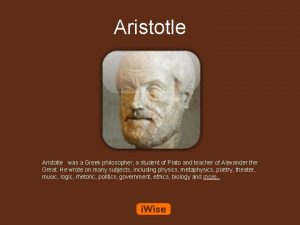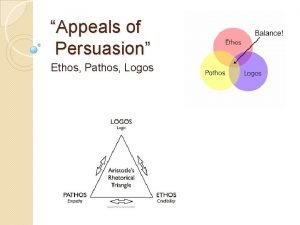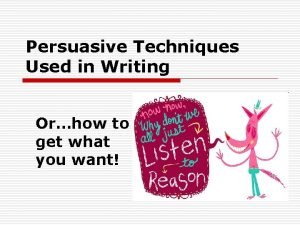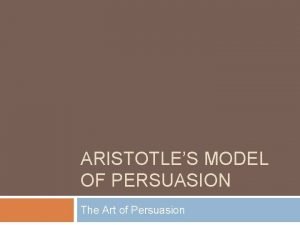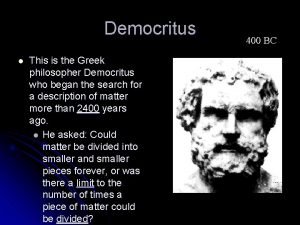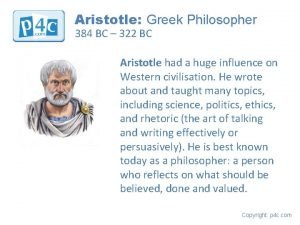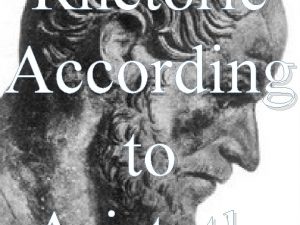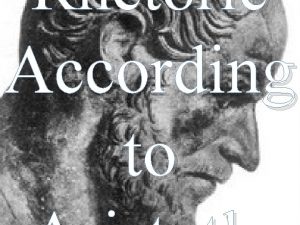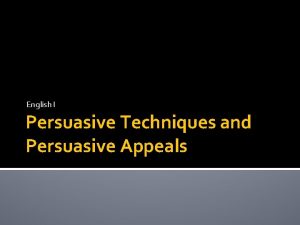PERSUASIVE APPEALS ACCORDING TO GREEK PHILOSOPHER ARISTOTLE PERSUASION









- Slides: 9

PERSUASIVE APPEALS ACCORDING TO GREEK PHILOSOPHER ARISTOTLE, PERSUASION IS BROUGHT ABOUT THROUGH THREE KINDS OF RHETORICAL DEVICES, OR PERSUASIVE APPEALS, WHICH WORK TOGETHER TO CREATE AN ARGUMENT TO PERSUADE PEOPLE TO SEE YOUR SIDE OF THE STORY.

ETHICAL = ETHOS The appeal of someone's character and credibility This could be through the establishment of: • • honesty, fairness, and trustworthiness sense of right or wrong through beliefs, morals, and values authority/expertise/life experience on the subject respect and regard for audience/opponents How could you use an ethical appeal to convince your parents to let you attend a party this weekend?

EMOTIONAL = PATHOS The appeal to someone’s emotions These could include appeals to: • • • hate, sadness, fear, or anger love, joy, comfort, or excitement pride or patriotism jealousy or greed guilt, pity, or obligation for others/loved ones vanity/worry to look/stay young How could you use an emotional appeal to convince your parents to let you attend a party this weekend?

LOGICAL = LOGOS The appeal to someone’s mind with reason and logic This could include use of: • • • facts, statistics, or graphs logical examples and reasons cause and effect supporting evidence factual testimony from authorities planned organization How could you use a logical appeal to convince your parents to let you attend a party this weekend?

FALLACIES

FALLACIOUS REASONING An incorrect argumentation in reasoning resulting in a misconception or presumption. By accident or design, fallacies may exploit emotional triggers in the listener or person engaging in the argument (appeal to emotion), or take advantage of social relationships between people (e. g. argument from authority). Fallacious arguments are often structured using rhetorical patterns that obscure any logical argument. Watch how Mr. Gilmer uses fallacious reasoning in his argument!

APPEALS PRACTICE Google Chrome: Dear Sophie Colgate Total Campbell's Light Versus Mc. Donald's Scandal- Interview

HOMEWORK… 1. Tone in safari article… 2. Tone in marijuana article… 3. Don’t start main idea sentence with the work “to” or “that” 4. Don’t say something like “The article tells about…” or “The author tells about…” to start your main idea. It should look more like “Dave Barry’s African safari was…” or “Studies show that…” 5. You must clearly connect the supporting details you chose to the main idea that you wrote. This is what the explanation part of the organizer is for. 6. Choose one purpose for each article. 7. Choose one tone word for each article. 8. Don’t be lazy with your key words/phrases for tone.

ANNOTATING YOUR ARTICLE: 1. Underline at least three words you are unfamiliar with, or just the three that you are the least familiar with. Define them in the margins or at the top of the text. 2. Put a ? by anything you find confusing. When you partner up, try to come up with an answer to your questions and jot it down next to the detail. 3. 1, 2, 3 Number any appeals that the author uses that clearly support his argument. 4. Write your own thoughts and reactions in the margins. Use an arrow to connect your thoughts to the details you’re reacting to. You need at least two of these.


